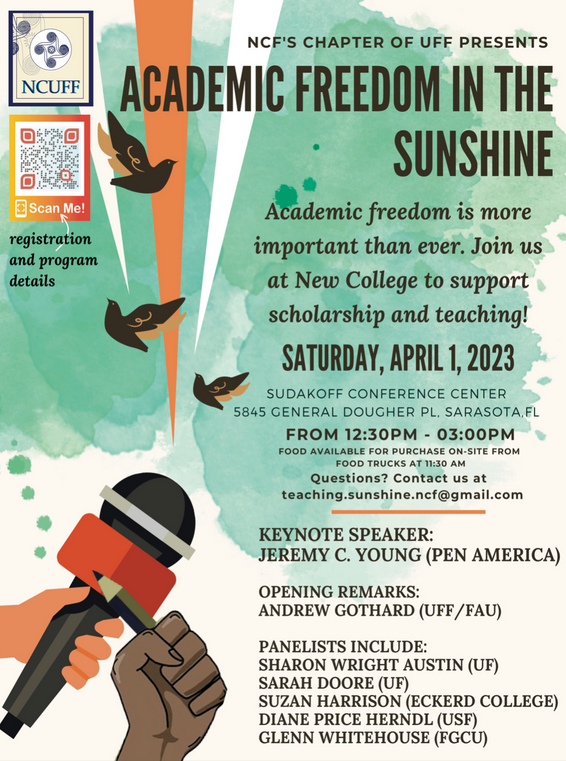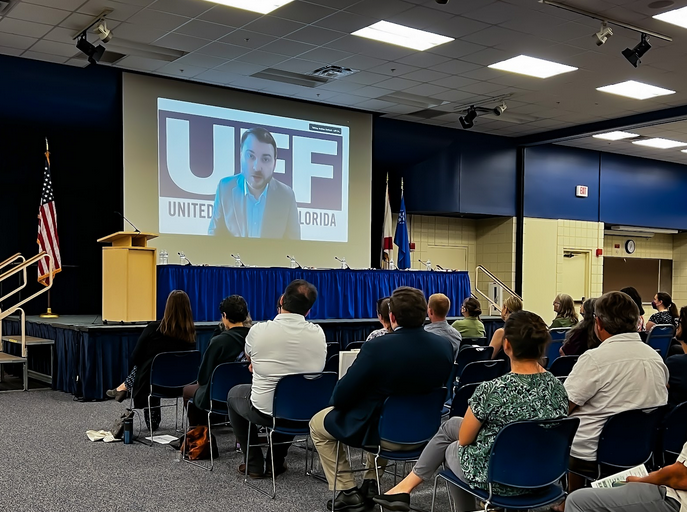By Nat Kornblum & Chloe Rusek
Florida’s educators have found themselves the target of an ongoing culture war. House Bill 999 has recently joined the itinerary of Florida bills centered on parental rights and educational freedom, which severely restricts women’s and gender studies courses and majors and bans any diversity, equity and inclusion (DEI) programs from state universities. All of these bills bar educators, from the elementary through collegiate level, from teaching relevant theory and history. Florida faculty took steps to fight back against this censorship by organizing Academic Freedom in the Sunshine, a teach-in hosted by the New College chapter of the United Faculty of Florida (NCUFF) on Apr. 1 at New College.
About 100 students, faculty, alumni and community members gathered in the Sudakoff Conference Center in preparation for the union-sponsored event, which also received a stipend of $1,900 from the Save New College gofundme.
The teach-in was co-organized by Professor of Anthropology and Catalyst sponsor Maria Vesperi and Professor of Biology Amy Clore, who is also Vice President of NCUFF.
“We had been having discussions for several months about what to do, how to respond in a way that makes meaning out of what’s been happening,” Vesperi said. “We felt that our part of it is the issue of academic freedom: what does that mean, what is our responsibility and what are our rights? I’m grateful that so many people are paying attention and trying in their own ways to understand what this is about, because there’s so much at stake.”
“I really believe it was important to discuss the salient topic of academic freedom, now more than ever,” Clore said. “There’s a reason why people come to the United States to study, and I’m hoping that somehow, we’ll be moving through this and getting the ability to be more innovative and more creative, not the exact opposite.”
“Academic freedom is foundational to the American experience,” Gothard opened.
In a 15 minute speech, Gothard emphasized the potential dangers of HB 999, which would ban not only majors or minors in gender and ethnic studies, but also any major or minor which uses any analytical framework the current administration finds issue with, such as but not limited to critical race theory (CRT) or intersectionality.
Gothard, who teaches English at Florida Atlantic University, also spoke out against HB 999’s attack on tenure, explaining that faculty can have their tenure removed for the vaguely defined “unbecoming conduct” and can be brought before the governor-appointed Board of Trustees (BOT), many of whom may be out-of-state or have no prior experience in higher education.

“What we are seeing across Florida, even beyond academic freedom, is a desire of Gov. Ron Desantis to draw more power to himself, to consolidate more and more power in the executive,” said Gothard. “We, as Floridians, deserve better than what we are getting from our governor right now, we deserve better from our administrators, we deserve better from our BOTs, we deserve better from our Representatives and our Senators and we deserve better from Gov. DeSantis.”
Gothard ended his speech by emphasizing the importance of solidarity and forming coalitions in the face of authoritarianism and fascist regimes.
“New College is an absolute gem of an institution,” Gothard said. “As long as I am President of the UFF, we will fight to defend New College.”
Moving into the second segment of the event, a panel made up of a diverse academic crowd expressed their feelings towards recent changes in Florida’s academic system.
The panel included Professor of Political Science and African American studies Sharon Wright Austin of the University of Florida (UF), who said “I have been involved in the fight for academic freedom here in Florida extensively in the last couple years, when two of my colleagues and I wanted to be expert witnesses in a voting rights lawsuit and we were told that we couldn’t. It set off a firestorm controversy and eventually we ended up having to file a lawsuit against that institution and we ended up winning that lawsuit.”
Assistant Professor of Microbiology and Cell Science Sarah Doore (‘07) at UF received her undergraduate education at New College. Doore spoke about how not just the Humanities are under attack, but that folks in Science, Technology, Engineering and Mathematics (STEM) should also be wary of what is currently happening in the Florida education system.
“We need to be able to look at these ideas and have a lot of different viewpoints come in and be able to examine them objectively,” Doore said. “In addition to evolution, there’s things like the origin of COVID-19 […] There are a lot of ideas in science that are still touchy and we need to be able to talk about them because they keep coming up.”
Diane Price Herndl, Department Chair of Women’s & Gender Studies and Professor of English at University of South Florida (USF), also spoke about how the current political climate reflects specifically on her area of study.
“This seems especially odd to me given that my field, women’s and gender studies, has been struggling against hierarchies that divide people since its inception slightly more than 50 years ago,” Herndl said. “Had I known that I have had the power to indoctrinate students […] I’m not sure even now that I would have wielded that power.”
The event’s keynote speaker was Jeremy Young, Senior Manager of Free Expression and Education at PEN America, an organization that works to protect free speech and promote access to literature free of political censorship.
“It’s wonderful to be here taking advantage of the academic freedom and free expression that this campus has always been known for,” Young said. “I can’t think of a place I’d rather be to talk about the importance of free speech on campus than right here, on the front lines of the fight for free colleges and universities in our free society.”
He then quoted a few conservative legislators who have spoken highly of New College in the past three years, including Rep. Vern Buchanan (R), Sen. Joe Gruters (R), and former U.S. Representative and alum Lincoln Diaz-Balart (‘75). Young also lambasted Trustee Christopher Rufo’s conduct towards New College students, parents and faculty on Twitter.
“What changed at New College that suddenly turned an impressive school with a storied history into a hub of indoctrination so nefarious, it required a takeover by out-of-state political operatives?” he asked. “Nothing. Nothing at all changed. Instead, things changed everywhere else.”
Young described much of the push-back against CRT and DEI initiatives in education as “right-wing backlash” against the racial reckoning that occurred for many Americans in 2020 in the wake of the murder of George Floyd.
Referring to the wording of bills like HB 999, Young said, “this language isn’t just banning policies. It’s banning ideas. It’s saying that in some settings, you can’t even talk about ideas that the government doesn’t like. PEN America calls this an educational gag order.”
Gag orders, according to Young, are currently in effect in 18 states, home to over one third of the American population.
“HB 999 would enact the most draconian and censorious restrictions on public higher education anywhere in the country,” he said.
To conclude, Young emphasized the importance of academic and intellectual freedom to democracy and the dangers of censorship. He encouraged professors to continue teaching what they know unless explicitly told not to, and that all parties affected by HB 999 band together and speak up.
“Don’t do the censors’ work for them,” he said. “If someone is going to deprive your students of the content they need, let it be someone else. Speak up, and show up.”
Young received a standing ovation for his closing words before opening up the floor for questions.
A student in the audience asked Young about the value of staying to fight when censorship is rapidly increasing. Young responded, “These policies are going to hurt a lot of people in the short term and medium term. I don’t believe that they will be unchallenged forever. I do think that, you know, in a few years, in a generation, hopefully less than that, there will be a return to approaches that we had before.”
Young concluded his segment by thanking the organizers and expressing the importance of the event in bringing people together in such difficult distressing times.
“This is a powerful meaning making exercise,” Young said. “It is powerful that you are all here—it matters, it’s inspiring, it’s a big deal. This is a big deal that you are here. I am so thankful to all of you for letting me share this time with you and inviting me here. Thank you.”

